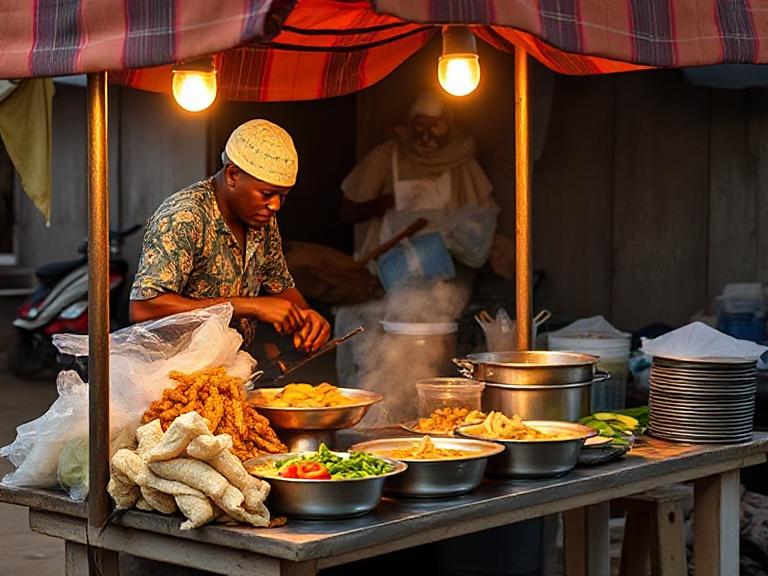A Day in the Life of an Abuja Food Vendor: Behind the Scenes
Hussein - AbujaEats
Food Writer & Critic

Behind every delicious meal in Abuja stands someone who woke before dawn, sourced fresh ingredients, and spent hours preparing food with skill and care. This glimpse into a typical food vendor's day reveals the dedication, challenges, and passion that fuel Abuja's vibrant food scene.

4:30 AM - The Day Begins
While most of Abuja sleeps, food vendors are already moving. The alarm sounds in the darkness, and there's no snooze button—customers expect fresh food, and fresh means early.
Morning Routine
Personal Preparation: Quick wash, simple breakfast (often leftovers from yesterday), and mental preparation for the long day ahead.
Market Planning: Mental checklist of ingredients needed, budget calculations, and route planning to hit multiple markets if necessary.
Transportation: For many vendors, this means catching early public transport or arranging motorcycle taxis to reach markets before the best items sell out.
Why So Early?
Freshness: The earliest produce is the freshest, picked yesterday and delivered overnight.
Selection: Popular items sell out quickly. Late arrivals get picked-over selections.
Prices: Some wholesale vendors offer better prices to early buyers.
Competition: Other vendors are also shopping early. Timing matters.
5:30 AM - Market Shopping
The market buzzes with activity even at this hour. Wholesale sections operate under dim lights, with vendors calling out prices and quality claims.
Produce Selection: Examining tomatoes for firmness, peppers for freshness, onions for quality. Years of experience allow quick assessment.
Protein Purchases: Fresh fish vendors display their catch. Meat sellers prepare cuts. Decisions balance quality against budget constraints.
Bargaining: Even regular customers negotiate. Every naira saved on ingredients means better profit margins.

7:00 AM - Preparation Begins
Setting Up
Location Preparation: Claiming space, setting up tables, arranging cooking equipment.
Equipment Check: Ensuring stoves work, gas cylinders have fuel, utensils are clean.
Ingredient Prep: Washing vegetables, cutting onions, preparing proteins, mixing spices. This can take 2-3 hours.
The Prep Work
Vegetables: Washing, chopping, sorting. Tomatoes and peppers get blended for stews.
Proteins: Fish cleaned and seasoned. Meat cut and marinated.
Base Preparations: Cooking rice, preparing swallow dough, making soup bases.
Spice Blending: Mixing signature spice combinations that make each vendor's food unique.
10:00 AM - First Customers Arrive
The Rush Begins
Early Customers: Workers grabbing breakfast, students heading to class, early shoppers needing a meal.
Service Mode: Switching from preparation to customer interaction. Friendly greetings, taking orders, managing multiple requests.
Cooking to Order: Some items prepared fresh per order. Others served from prepared batches.
Money Management: Making change, tracking sales, keeping cash secure while staying focused on cooking.

12:00 PM - Lunch Rush
Peak Hours
This is what vendors prepare for—the lunch rush when workers flood out of offices and everyone needs food quickly.
Maximum Efficiency: Every movement counts. Experienced vendors develop systems for speed.
Quality Under Pressure: Maintaining standards while moving fast.
Physical Demands: Standing for hours, working over hot stoves, constant movement.
Mental Calculations: Tracking orders, managing inventory, deciding whether supplies will last.
The Satisfaction
Despite the pressure, this is also the most rewarding time. Seeing customers enjoy food, hearing compliments, building a line of people who chose your spot—this validates the early morning and hard work.
2:30 PM - Afternoon Lull
Slower Period
Cleanup: Washing dishes, wiping surfaces, organizing workspace.
Inventory Assessment: Checking what sold, what remains, what needs preparation for evening service.
Personal Break: First real chance to eat, rest, catch breath.
Restocking: If items sold out, quick market trips to replenish for evening customers.
5:00 PM - Evening Service
Second Wave
Different Customers: Evening crowd differs from lunch—more families, people heading home, those seeking dinner.
Menu Adjustments: Some vendors offer different items in evening.
Lighting: As daylight fades, setting up lights for evening service.
Energy Management: Finding second wind after long day.

8:00 PM - Winding Down
Closing Procedures
Final Customers: Serving last orders, sometimes offering discounts on remaining food.
Cleanup: Thorough washing of all equipment, utensils, surfaces.
Inventory: Assessing what can be saved for tomorrow, what must be discarded.
Money Counting: Tallying the day's earnings, calculating profit after expenses.
Equipment Securing: Locking up, protecting equipment from theft or weather.
9:30 PM - Journey Home
After 17 hours of work, the vendor finally heads home. Public transport is less frequent at this hour. The journey home provides time to decompress, think about the day, plan for tomorrow.
Physical Exhaustion: Feet ache, back hurts, hands are tired. The physical toll of food vending is real.
Mental Review: What sold well? What didn't? What to adjust tomorrow?
Financial Calculations: Did today's sales cover expenses? Is there profit? Can bills be paid?
10:30 PM - Home at Last
Brief Family Time: If lucky, catching up with family before sleep.
Meal: Finally eating a proper meal, often simple after cooking all day.
Preparation for Tomorrow: Setting alarm, mentally preparing for another early start.
Sleep: By 11 PM, sleep comes quickly. Tomorrow starts in 5.5 hours.
The Challenges
Financial Pressures
Thin Margins: Profit margins are often razor-thin. Small price increases in ingredients can eliminate profit.
Capital Constraints: Limited funds mean limited inventory, which can mean lost sales.
Unpredictable Income: Some days are great, others disappointing. Budgeting is difficult.
No Safety Net: No sick days, no vacation days. Not working means not earning.
Physical Demands
Long Hours: 15-17 hour days are standard, not exceptional.
Standing: Hours on feet lead to back pain, leg problems, varicose veins.
Heat Exposure: Working over hot stoves in tropical climate takes its toll.
Repetitive Strain: Same motions thousands of times lead to joint problems.
Regulatory Challenges
Permits: Navigating licensing requirements, health inspections, location permits.
Harassment: Some vendors face harassment from authorities or landlords.
Uncertainty: Lack of permanent locations creates instability.
Competition: New vendors constantly entering the market.
The Rewards
Personal Satisfaction
Independence: Being your own boss, making your own decisions.
Skill Pride: Mastering recipes, developing signature dishes.
Customer Relationships: Regular customers become friends, part of extended family.
Community Role: Feeding people, being essential part of neighborhood.
Financial Independence
Direct Earnings: Money earned goes directly to vendor, not employer.
Growth Potential: Successful vendors can expand, hire help, open permanent locations.
Family Support: Many vendors support families, send children to school, build homes.
Flexibility: Setting own hours, choosing menu items, controlling business.
The Passion
Despite challenges, most food vendors love what they do. There's pride in feeding people, satisfaction in perfecting recipes, joy in customer appreciation.
Culinary Heritage: Many vendors preserve traditional recipes, passing them to next generation.
Innovation: Others experiment, creating new dishes, fusion concepts.
Community Building: Food vendors create gathering places, social hubs.
Economic Contribution: Providing affordable meals, creating jobs, supporting local agriculture.
Supporting Food Vendors
As Customers
Fair Prices: Recognize the work involved, don't over-bargain.
Respect: Treat vendors with dignity and courtesy.
Loyalty: Regular customers help vendors plan and sustain business.
Recommendations: Word-of-mouth is powerful marketing for vendors.
Patience: Understand that quality takes time, especially during rush hours.
As Community
Advocacy: Support policies that help rather than hinder vendors.
Infrastructure: Push for better market facilities, vendor spaces.
Recognition: Acknowledge vendors' contribution to food culture.
Training: Support programs that help vendors improve skills, business practices.
The Future
Abuja's food vendor community faces both challenges and opportunities. Rising costs, regulatory pressures, and competition from restaurants create difficulties. But growing appreciation for street food, social media marketing opportunities, and increasing food tourism offer new possibilities.
The next generation of vendors is more educated, tech-savvy, and business-minded. They're professionalizing street food while maintaining its authentic character. Some are transitioning from street vending to permanent restaurants, taking their recipes and customer bases with them.
Your Role
Next time you buy food from a vendor in Abuja, remember the story behind that meal. The 4:30 AM wake-up, the market shopping, the hours of preparation, the physical demands, the passion and pride. That ₦1,500 plate of food represents someone's livelihood, skill, and dedication.
Support vendors by being a good customer—patient, respectful, fair. Share your positive experiences. Recognize that these vendors are preserving culinary traditions, feeding communities, and contributing to Abuja's vibrant food culture.
The food vendors of Abuja work hard so you can eat well. Their day starts before yours and ends after yours, all to ensure that when hunger strikes, delicious, affordable food is available. That's dedication worth acknowledging and supporting.
Appreciate Abuja's food vendors? Follow AbujaEats for stories celebrating the people behind your favorite meals, vendor spotlights, and ways to support Abuja's street food culture.
Never Miss a Food Review
Join our community of food lovers and get weekly restaurant recommendations, exclusive dining tips, and the latest food news in Abuja.
Own a Restaurant in Abuja?
Get featured on AbujaEats and reach food lovers across the city.
List Your Restaurant